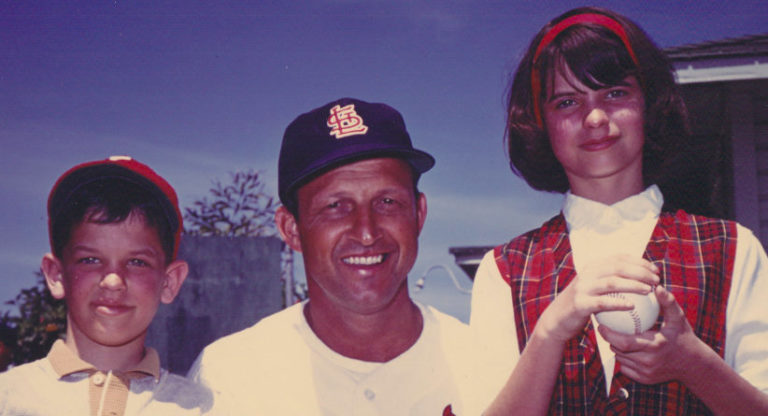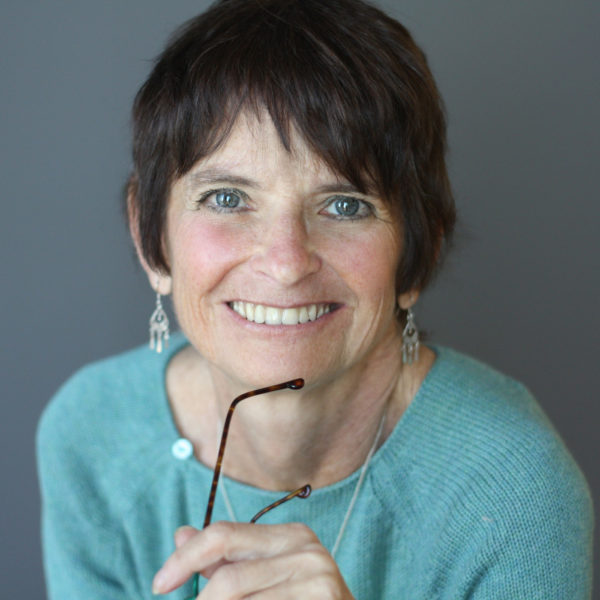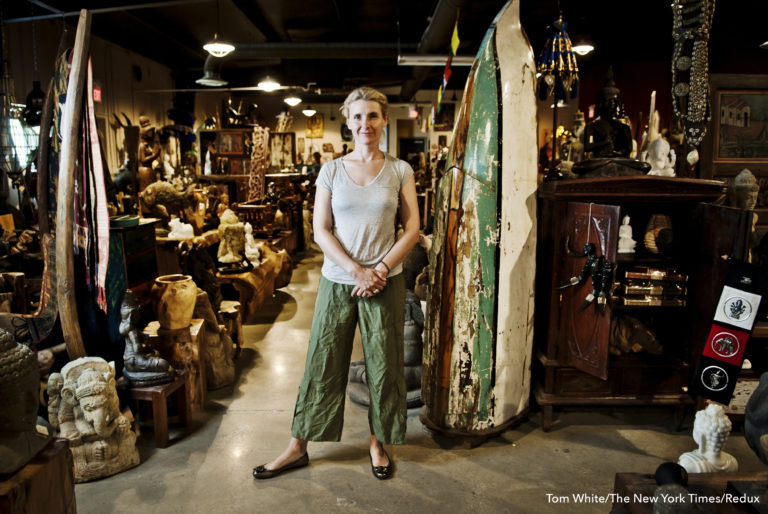
Image by Jane Gross.
Shedding the Mantle of Glory, Behind the Batting Cage
My father, Milton Gross, was the Yankees beat writer for the New York Post from 1938 to 1949, then its syndicated sports columnist until his death in 1973, and I spent my childhood in the company of world-famous athletes.
At spring training in the mid 1950s, pulled from school and tutored for two months every winter, I’d go to the ball park with my father, and Whitey Ford, Don Larsen, or Sal Maglie would pitch to me. I always walked on four pitches, which the grown-ups said was because I was too small to have a strike zone.
At the old Madison Square Garden, I sat at the press table with my father and watched Cazzie Russell and Bill Bradley go to head-to-head for the University of Michigan and Princeton in the 1964 Holiday Festival, which launched them both to professional careers with the Knicks. Afterward, in the bowels of the arena, I practiced cheerleading and did my homework while my father chain-smoked and banged out his column on a portable Olivetti typewriter.
To me, Toots Shor wasn’t a celebrity hangout but a restaurant where the reclusive Joe DiMaggio could eat dinner at a table in a dim corner so nobody would bother him. Floyd Patterson wasn’t the heavyweight champion of the world, but a nice man who sent my brother and me postcards from his world travels. Tickets to the first Muhammad Ali-Joe Frazier fight, in New York in 1971, meant a date with a boy who otherwise wouldn’t give me a second look, and had thrown me over when we dated in college.
I knew Jackie Robinson and Don Newcombe, Casey Stengel, and Yogi Berra. I also knew Willis Reed and Walt Frazier — in their case in two iterations, once as my father’s daughter and again in my own right, when I wound up a sports reporter myself. Nepotism and affirmative action had brought me to a career I reluctantly pursued for almost a decade, at Sports Illustrated magazine, the Long Island newspaper Newsday, and finally at The New York Times.
The Knicks team my father had covered until weeks before his death was almost identical to the one I would cover four years later, in 1977. It was there that I earned the dubious distinction of being the first woman allowed in a men’s professional locker room, unfathomable had my father still been alive and working alongside me amid a bunch of naked men.

It’s fair to ask why all this matters, interesting though it might be. Was my childhood exciting? In retrospect, I understand it was, but as a kid I thought it was normal. It was like going to work with your father if he’s a lawyer or an accountant or the superintendent of an apartment building. My super’s son hangs out with him when he’s waxing the floors or polishing the brass or removing snow from the awning out front. Maybe, because he sees how much his father loves his work, he’ll grow up to be a superintendent. That’s what I did.
The athletes I knew as a child didn’t thrill me. Some were nicer than others, and if I measured them at all, that was the likely standard, not fame. They were big, strong men with a special talent. They were good at their jobs as my lawyer is good at his — or my financial advisor, or my superintendent. They weren’t gods. Only much later did I realize they were “famous,” which made fame a slippery concept, less empirical than in the eye of the beholder.
The athletes I knew as an adult also didn’t thrill me. Some were nicer than others, and that mattered even more to me than it had when I was a child, because female sports reporters, then and now, bear the brunt of some foul-mouthed misogyny. Nothing I experienced matched this Twitter-storm, since in those days you had to insult people to their faces, not virtually. But I heard my share of the “C” word, cried in many a stairwell, then pulled myself together to do my work. When I switched from sports to news, after years of lobbying for the change, it was a relief. Only later did I appreciate that being a pioneer mattered. In ball parks all over America today are women sports reporters who wrote me letters as young girls saying I’d shown them what was possible.
In my experience, the athletes were more supportive then my fellow reporters, who didn’t want to share their privileged turf. And the kindest athletes of all were African-American, perhaps because they’d experienced prejudice first-hand. I didn’t fawn over the athletes as some reporters did (especially the men). I talked to them, wrote about them, asked non-sports questions about, say, how their wives and children were holding up in the vent of a trade. I spent lots of time with them, on buses and airplanes and behind the batting cage.
They always seemed appreciative that I wasn’t asking for an autograph for my next-door neighbor or my great uncle once-removed. Surrounded by sycophants and hangers-on, they seemed to welcome being treated like normal people, with strengths and weaknesses, routine problems, less-than-perfect lives. More than anything else that I learned from my father, without realizing I was studying for the role, is that glory is a heavy mantle and celebrities are glad to put it down.


